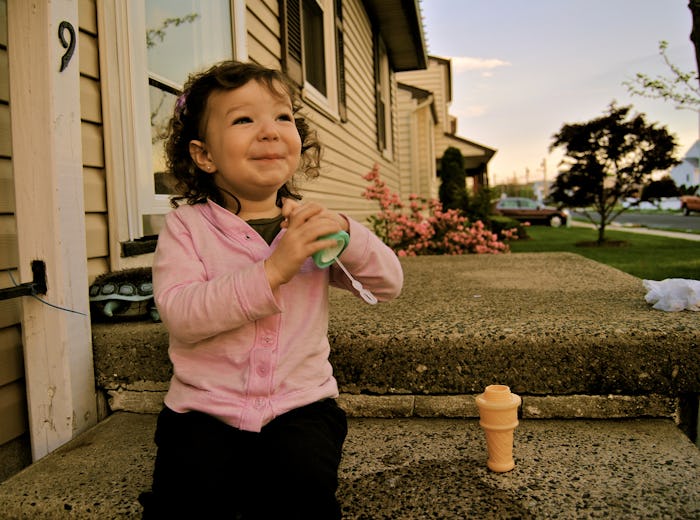Life
7 Times When You Should Definitely Listen To Your Toddler Saying "No"
If all goes according to plan, babies grow into toddlers, and those toddlers begin to assert their independence in subtle (and not-so-subtle) ways. I have rolled my eyes plenty of times as the word "no" entered the vocabulary in our home, but there are times when your toddler says no that you should actually listen.
I know that I, for one, have had trouble transitioning from the all-knowing parent of a baby to the parent of a toddler who's starting to figure things out for themselves. I was terrible at letting my oldest kid experiment with all the new skills she was readily learning when she was a toddler. That sounds terrible now, but at the time, it was easy to justify feeding her myself (in order to avoid giant messes), or dressing her myself (in order to get out the door on time). I paid the price though. The result? I have a now-4-year-old who still prefers to be fed, rather than feeding herself.
Beyond that, I think it's really important for us as parents to begin to show respect for what our kids think and feel. Obviously, we aren't going to respect their choice to, say, climb up on the dining room chair, stand up, and then shake their head when we ask them to sit on their bum. But there are certain times when it's important to really listen to what your toddler is saying when they say "no," instead of just writing it off as being contrary. Here are seven of those times:
When You're Tickling Them And They Want You To Stop
It's always surprising how fast tickling can go from hilarious and gleeful to full-on torture.
When You Ask If They're Hungry
If you've gone through the list of possible foods they might eat (aside from treats, clearly) and they're saying no to everything, even though it's dinner time, there's no use in trying to force things. Toddlers self-regulate when it comes to eating, so they will likely catch up the next day by eating you out of house and home.
When They're Trying To Eat By Themselves
It can be stab-yourself-in-the-eye-with-a-spoon painful to watch your kid try to master the art of using utensils to eat, and you may find that you need to sit on your hands to stop yourself from helping them. If they're saying "no" to you doing it for them, though, they are likely learning something very important.
When You Try To Help Them Get Dressed
I know. It's so much faster when you can help them, right? But if they're resisting your help and trying to do it themselves, you need to respect their desire to be independent, no matter how annoying it is.
When They're Scared Of Something
You just never know what is going to scare the crap out of a kid. My son is afraid of stuffed toy horses. Like, he loses his mind if he spots one in the same room as him (imagine how much fun Christmas was, when his older sister got a hobby horse and ran around the house with it!). It's never OK to continue to expose your kid to something they're scared of, once you realize the cause of their terror.
When You Ask Them To Try Something New
Maybe it's going down a slide, maybe it's getting on a tricycle. Either way, new experiences can be terrifying to toddlers, and the last thing we want to do is make them feel helpless by forcing them to try something. They'll try it when they are ready, and we need to respect that.
When They Don't Want To Be Kissed/Hugged/Held
This is probably the most important point, overall. It's absolutely necessary to teach your kids, from an early age, about the importance of consent and bodily autonomy. The best way to do that is by respecting your child's "no" yourself, because it gives weight to the idea that adults need to respect their choices as well. If there is another adult in your child's life who is pushing boundaries, don't you want them to feel comfortable telling that adult "no?" Right. And they're far more likely to do that if we, their parents, teach them that their "no" has power.
